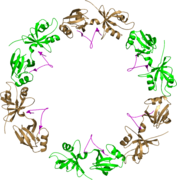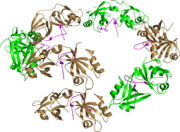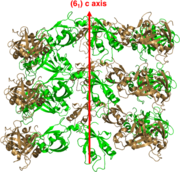From Wikipedia, the free encyclopedia
Golgi reassembly-stacking protein of 65 kDa (GRASP65 ) also known as Golgi reassembly-stacking protein 1 (GORASP1 ) is a protein that in humans is encoded by the GORASP1 gene .[ 5]
Function
Microinjection of antibodies to GRASP65 prevents normal Golgi stack formation.[ 6] The Golgi complex plays a key role in the sorting and modification of proteins exported from the endoplasmic reticulum . The GRASP65 protein is a peripheral membrane protein anchored to the lipid bilayer through myristoylation of a glycine residue near the protein's amino terminus .[ 7] [ 7] caspase-3 substrate, and cleavage of this encoded protein contributes to Golgi fragmentation in apoptosis.[ 8] [ 9] GM130 , and this complex binds to the vesicle docking protein p115 .[ 7] [ a] [ 5]
Structure
GRASP65 contains two PDZ domains in the amino-terminal GRASP domain (amino acid residues 2–210), that comprises approximately half of the protein. The GRASP region interacts with the Golgi matrix protein GM130 as well as an intrinsically disordered region in the C-terminus .[ 7] [ 10]
GRASP65 superhelix, topview
[ 7]
GRASP65 superhelix, side view
[ 7]
Interactions
GORASP1 has been shown to interact with TGF alpha ,[ 11] TMED2 [ 11] GOLGA2 .[ 11] [ 12] [ 13]
Notes
^ This is shown in the external link entitled "Molecular models of GRASP65/GM130/P115-mediated cis-cisternae membrane stacking and vesicle tethering."
References
^ a b c GRCh38: Ensembl release 89: ENSG00000114745 – Ensembl , May 2017^ a b c GRCm38: Ensembl release 89: ENSMUSG00000032513 – Ensembl , May 2017^ "Human PubMed Reference:" . National Center for Biotechnology Information, U.S. National Library of Medicine .^ "Mouse PubMed Reference:" . National Center for Biotechnology Information, U.S. National Library of Medicine .^ a b "Entrez Gene: GORASP1 golgi reassembly stacking protein 1, 65kDa" .^ Wang Y, Wei JH, Bisel B, Tang D, Seemann J (February 2008). "Golgi cisternal unstacking stimulates COPI vesicle budding and protein transport" . PLoS One . 3 (2): e1647. doi :10.1371/journal.pone.0001647 . PMC 2249924 PMID 18297130 . {{cite journal }}: CS1 maint: unflagged free DOI (link )^ a b c d e f Hu F, Shi X, Li B, Huang X, Morelli X, Shi N (2015). "Structural basis for the interaction between the Golgi reassembly-stacking protein GRASP65 and the Golgi matrix protein GM130" . The Journal of Biological Chemistry . 290 (44): 26373–82. doi :10.1074/jbc.M115.657940 . PMC 4646294 PMID 26363069 . {{cite journal }}: CS1 maint: unflagged free DOI (link )^ Lane JD, Lucocq J, Pryde J, Barr FA, Woodman PG, Allan VJ, Lowe M (2002). "Caspase-mediated cleavage of the stacking protein GRASP65 is required for Golgi fragmentation during apoptosis" . The Journal of Cell Biology . 156 (3): 495–509. doi :10.1083/jcb.200110007 . PMC 2173349 PMID 11815631 . ^ Cheng JP, Betin VM, Weir H, Shelmani GM, Moss DK, Lane JD (2010). "Caspase cleavage of the Golgi stacking factor GRASP65 is required for Fas/CD95-mediated apoptosis" . Cell Death & Disease . 1 (10): e82. doi :10.1038/cddis.2010.59 . PMC 3035901 PMID 21368855 . ^ Rabouille C, Linstedt AD (2016). "GRASP: A Multitasking Tether" . Frontiers in Cell and Developmental Biology . 4 : 1. doi :10.3389/fcell.2016.00001 . PMC 4726779 PMID 26858948 . {{cite journal }}: CS1 maint: unflagged free DOI (link )^ a b c Barr FA, Preisinger C, Kopajtich R, Körner R (December 2001). "Golgi matrix proteins interact with p24 cargo receptors and aid their efficient retention in the Golgi apparatus" . The Journal of Cell Biology . 155 (6): 885–91. doi :10.1083/jcb.200108102 . PMC 2150891 PMID 11739402 . ^ Short B, Preisinger C, Körner R, Kopajtich R, Byron O, Barr FA (December 2001). "A GRASP55-rab2 effector complex linking Golgi structure to membrane traffic" . The Journal of Cell Biology . 155 (6): 877–83. doi :10.1083/jcb.200108079 . PMC 2150909 PMID 11739401 . ^ Shorter J, Watson R, Giannakou ME, Clarke M, Warren G, Barr FA (September 1999). "GRASP55, a second mammalian GRASP protein involved in the stacking of Golgi cisternae in a cell-free system" . The EMBO Journal . 18 (18): 4949–60. doi :10.1093/emboj/18.18.4949 . PMC 1171566 PMID 10487747 .
Further reading
Barr FA, Puype M, Vandekerckhove J, Warren G (October 1997). "GRASP65, a protein involved in the stacking of Golgi cisternae". Cell . 91 (2): 253–62. doi :10.1016/S0092-8674(00)80407-9 . PMID 9346242 . Barr FA, Nakamura N, Warren G (June 1998). "Mapping the interaction between GRASP65 and GM130, components of a protein complex involved in the stacking of Golgi cisternae" . The EMBO Journal . 17 (12): 3258–68. doi :10.1093/emboj/17.12.3258 . PMC 1170664 PMID 9628863 . Lin CY, Madsen ML, Yarm FR, Jang YJ, Liu X, Erikson RL (November 2000). "Peripheral Golgi protein GRASP65 is a target of mitotic polo-like kinase (Plk) and Cdc2" . Proceedings of the National Academy of Sciences of the United States of America . 97 (23): 12589–94. doi :10.1073/pnas.220423497 . PMC 18808 PMID 11050165 . Moyer BD, Allan BB, Balch WE (April 2001). "Rab1 interaction with a GM130 effector complex regulates COPII vesicle cis--Golgi tethering". Traffic . 2 (4): 268–76. doi :10.1034/j.1600-0854.2001.1o007.x . PMID 11285137 . Sütterlin C, Lin CY, Feng Y, Ferris DK, Erikson RL, Malhotra V (July 2001). "Polo-like kinase is required for the fragmentation of pericentriolar Golgi stacks during mitosis" . Proceedings of the National Academy of Sciences of the United States of America . 98 (16): 9128–32. doi :10.1073/pnas.161283998 . PMC 55384 PMID 11447294 . Ward TH, Polishchuk RS, Caplan S, Hirschberg K, Lippincott-Schwartz J (November 2001). "Maintenance of Golgi structure and function depends on the integrity of ER export" . The Journal of Cell Biology . 155 (4): 557–70. doi :10.1083/jcb.200107045 . PMC 2198855 PMID 11706049 . Lane JD, Lucocq J, Pryde J, Barr FA, Woodman PG, Allan VJ, Lowe M (February 2002). "Caspase-mediated cleavage of the stacking protein GRASP65 is required for Golgi fragmentation during apoptosis" . The Journal of Cell Biology . 156 (3): 495–509. doi :10.1083/jcb.200110007 . PMC 2173349 PMID 11815631 . Jesch SA (July 2002). "Inheriting a structural scaffold for Golgi biosynthesis". BioEssays . 24 (7): 584–7. doi :10.1002/bies.10122 . PMID 12111718 . Protopopov A, Kashuba V, Zabarovska VI, Muravenko OV, Lerman MI, Klein G, Zabarovsky ER (January 2003). "An integrated physical and gene map of the 3.5-Mb chromosome 3p21.3 (AP20) region implicated in major human epithelial malignancies". Cancer Research . 63 (2): 404–12. PMID 12543795 . Wang Y, Seemann J, Pypaert M, Shorter J, Warren G (July 2003). "A direct role for GRASP65 as a mitotically regulated Golgi stacking factor" . The EMBO Journal . 22 (13): 3279–90. doi :10.1093/emboj/cdg317 . PMC 165642 PMID 12839990 . Colland F, Jacq X, Trouplin V, Mougin C, Groizeleau C, Hamburger A, Meil A, Wojcik J, Legrain P, Gauthier JM (July 2004). "Functional proteomics mapping of a human signaling pathway" . Genome Research . 14 (7): 1324–32. doi :10.1101/gr.2334104 . PMC 442148 PMID 15231748 . Wang Y, Satoh A, Warren G (February 2005). "Mapping the functional domains of the Golgi stacking factor GRASP65" . The Journal of Biological Chemistry . 280 (6): 4921–8. doi :10.1074/jbc.M412407200 . PMC 4443495 PMID 15576368 . {{cite journal }}: CS1 maint: unflagged free DOI (link )Yoshimura S, Yoshioka K, Barr FA, Lowe M, Nakayama K, Ohkuma S, Nakamura N (June 2005). "Convergence of cell cycle regulation and growth factor signals on GRASP65" . The Journal of Biological Chemistry . 280 (24): 23048–56. doi :10.1074/jbc.M502442200 PMID 15834132 . Sütterlin C, Polishchuk R, Pecot M, Malhotra V (July 2005). "The Golgi-associated protein GRASP65 regulates spindle dynamics and is essential for cell division" . Molecular Biology of the Cell . 16 (7): 3211–22. doi :10.1091/mbc.E04-12-1065 . PMC 1165405 PMID 15888544 .
External links








![GRASP65 superhelix, topview[7]](http://upload.wikimedia.org/wikipedia/commons/thumb/f/fa/4REY_top_spheres_helix.png/175px-4REY_top_spheres_helix.png)


![GRASP65 superhelix, side view[7]](http://upload.wikimedia.org/wikipedia/commons/thumb/0/0b/4REY_side_layer_helix.png/180px-4REY_side_layer_helix.png)
